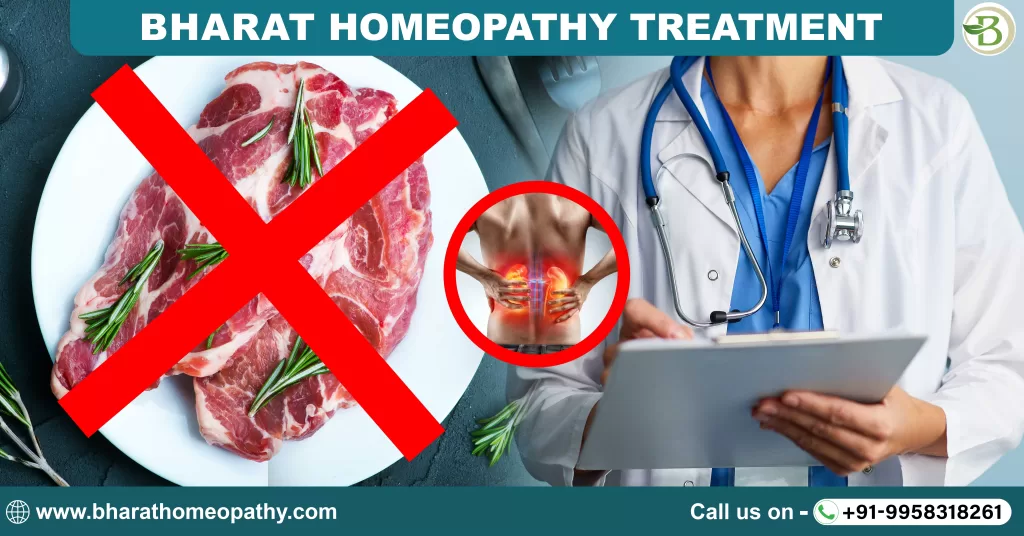What Does Non-Vegetarian Diet Cause to Kidney Patients?
The non-vegetarian food is not that beneficial for kidney patients. This is because the meat of the animal is made up of complex macromolecules such as proteins and lipids. When the protein gets metabolized or digested completely, the purine (organic compound) is released into the urine. This purine gets further metabolized to the uric acid. This uric acid causes acidosis.
Reasons why kidney patients should avoid non-vegetarian food:
The metabolism of the protein is associated with the release of toxic by-products. However, when the kidneys are damaged, they cannot clear the waste, due to which it accumulates in the body. Non-vegetarian foods should be avoided as they contain more protein, which increases the level of waste products. Proteinuria and hyper-uricemia are side effects of kidney disease. This is due to the excessive accumulation of protein in the urine. A diet rich in protein puts more load on the kidneys, which worsens the problem. The presence of salt and minerals such as potassium and phosphorus in non-vegetarian food can increase your sodium levels in the patients. High blood pressure is caused by the over-consumption of meat, which can be proved unhealthy for kidney patients. Fat is in more quantity in non-vegetarian food, due to which the person’s weight increases and he becomes unhealthy. The over-consumption of meat can also bring a marked increase in the along with many diseases which a kidney patient cannot handle. Many people wonder how their bodies can survive if they cut protein out of their diet altogether. Homeopathy has achieved excellent results in recovering kidney patients with Homeopathic Medicines.
WHY NORMAL AND KIDNEY-FRIENDLY DIET IS DIFFERENT
When someone is suffering from kidney disease it is obvious that their kidney is not working properly. This means all the activities that kidneys have to perform like excreting extra fluid, filtering out waste, and helping in some hormonal balance are obstructed. So the diet for a damaged kidney should be planned so that it does not increase fluid, toxic minerals, and waste in the body.
Then What Shall be Eaten by Non-Veg Avoiders?
Grains and cereals:
The wheat and rice shall be eaten by the Kidney patient. The rice can be taken if the patient does not have an issue with diabetes. The patient can take the rice in moderate quantities if the patient is not diabetic. The fine wheat flour can be eaten without any restriction. Cereals can be included in the Kidney disease diet.
Consumption of fresh Fruits :
If the Sodium and Potassium level is below the required amount, then you can eat fresh fruits such as papaya, Apple, Guava, and pineapple only in moderation.
Herbal and Green tea consumption, and not traditional tea:
The patient shall drink green tea or herbal tea in plenty of amounts. Green or herbal tea has a huge amount of antioxidants. The herbal and green tea tend to heal Chronic as well as chronic Kidney disease in patients. Green tea can also be included in the Kidney disease diet.
Exotic Dry fruits:
The healthy fat in the form of dry fruits shall be taken by the patients. Cashew, almonds, and walnuts are important to heal the patient suffering from Chronic Kidney disease. In addition, roasted dry fruits are important to include in the protein diet of the patient.
Herbal Tulsi and its extract:
Tulsi extract is herbal in nature, and it contains acetic acid, which helps break down kidney stones and reduce kidney pain. The antioxidants compounds in basil juice help treat Chronic Kidney disease. It is full of nutrients and minerals. Basil extract has been for urinary and inflammatory disorders.
Homeopathic Approach in the Treatment of Kidney disease:
The patients who took the homeopathic treatment believe that the disease-causing factors are treated properly. Even after many follow-up rounds after the treatment, the patients are listened to carefully. In the Kidney Disease homeopathic treatment, all other complications causing factors were also taken care of; so that the patient lives a healthy life. The Homeopathic Approach of treatment is highly compatible with the varying needs of the patients. In this Approach, the proper diet chart is given to the patients, and high-quality homeopathic medicines are given.
Allopathy v/s Homeopathy
- Allopathic medicines are made synthetically, and thus, they cause toxicity to the patient with kidney disease that is habitual of heavy meat-eating.
- In Allopathy, drugs are involved in the temporary decrease in the occurrence of the symptoms of different kidney diseases. Homeopathic medicine relies on highly specific medicinal compounds and doses, and they are helpful in getting rid of waste products after digestion of meat. First, the patients are thoroughly looked in at their previous medical records. And then, the doctor prescribes the best homeopathic medication.
- Homeopathy treats the patient as per the state of disease, whether it is acute or severe. For example, in Kidney Disease Homeopathic treatment, the patient is relieved from the unwanted disturbances and other symptoms, and the recurrence of the kidney disease is also prevented.
- A plenty number of good and healthy changes are seen in kidney disease patients undergoing Kidney Disease Homeopathic treatment. In addition, kidney patients become completely satisfied with the homeopathic treatment.
- Homeopathy treatment is a genuine and one of the safest and direct routes of healthcare that treats the patient physically and provides a good post-treatment experience.


